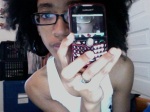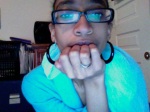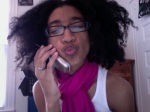love,
lex

Flamboyance: The Queer Survival of Black Feminism
Alexis Pauline Gumbs
Dedicated to Pauline McKenzie and Andria Hall
May I begin with an invocation?
This instant. This triumph. Black feminism was never meant to survive. This instant. This triumph. This is ritual. This instant and this triumph. Black feminism was never meant to survive. But here I am. Here we are. That is the queer thing. In 1981 by the time I was in my mother’s womb every explicitly black feminist organization in the United States was defunct, and the black women’s writing publishing trend was effectively over. Some say that black feminism went academic, went textual. Some say black feminism went new age, got touchy feely, stopped taking to the streets. Some say black feminism is anachronistic, useful only as a referent, a supplement, a precedent for something else. Black feminism (remember) is how we got this idea of interlocking systems of oppression, demarginalizing the intersection. But I have not heard anyone talk about the Combahee River Collective here. I have not heard us lift up the name Kimberlé Crenshaw yet at this conference about Radical Intersections. Hmm. It seems, black feminism was never meant to survive. And the queer thing is, here we are.
This is how I make my body legible to ancestors who I cannot choose or name. This is how I make my work accountable to swallowed rage in the mouths of people who were not invited. This is how we commune with the forgotten, reframe the possible, this is how we remember that we don’t know where we come from. This is makeshift reverence for pathways that do not meet, a time space that is not continuous. This is what her hand writing has to do with my slow breathing. This is what her late nights have to do with my early mornings. This is what his bitten tongue has to do with my declaration. This method is survival as performance, speech as meditation, memory as clothing, ocean as audience. This room is full of something that I will name black feminism. Tell me when it starts to burn.
Flamboyant. First an architectural term describing the construction of castles with framing blades, the colonial understanding of flowering trees, the Oxford English Dictionary remembers that flamboyant meant many things before it meant us, those of us who do not know better than to hide our brilliance, the transformative ones, burning like hell as we walk the earth. This meditation examines the way that black feminism survives in the queer bodies of work, bone, muscle and breath that remain, invoking the little known work of the Flamboyant Ladies, a performance group created by black lesbian feminists Alexis De Veaux and Gwendolyn Hardwick in their living room. This presentation situates the forgotten work of the Flamboyant Ladies, who created radical t-shirts, performance pieces, salons and a full day presentation about the impact of the nuclear moment on black communities in the 1970’s as a haunting, illegible precedent for the more contemporary work of UBUNTU and BrokenBeautiful Press, two initiatives based in Durham North Carolina that similarly use embodied poetics to respond to systemic violence, against women of color in the wake of the Duke Lacrosse and Dunbar Village cases and the torture and sexual assault of Megan Williams.
Seeking an embodied poetics of queer intergenerationality, a relationship between ancestors, elders and youth that survives by rejecting the social reproduction of oppression, rejecting the assumption that queerness and intergenerationality are mutually exclusive especially given the mandate that some of us are criminalized when we reproduce life and create family, this piece takes Flamboyance, that dangerous, queer stance, as a trajectory for the livelihood of feminism, taking seriously the (often cancerous) impact of the unceasing labor of and punishment for radical feminist work on the bodies of queer elders and ancestors including De Veaux, Hardwick, and collaborators, June Jordan and Audre Lorde. This is a work towards healing and survival. Healing and survival are queer methodologies for oppressed communities because we were never meant to survive. This is a collaborative offering of our bodies across time to the intergenerational work of performing, and making possible, the world we deserve.
The Flamboyant Lady Should Not Exist
Flamboyant Ladies co-founder and radical black lesbian feminist Alexis DeVeaux explains, “By the time Reagan came to power, opportunities for black women writers and artists, began to dry up in drastic kinds of ways. Publishers say ‘we have enough black books.’ The NEA becomes explicitly conservative.” Black women artists cannot support themselves with grants and publishing contracts from a lustful consuming public fascinated by the glamour of the self-articulation of black and feminine subjectivity. The novelty has worn off, it is no longer interesting that someone can be a woman and a black person at the same time. In fact by 1981 the Moynihan’s matriarchy thesis has become law and the danger of black women has become apparent. Reagan has by this time, coined the term welfare queen, that black woman who threatens the new neoliberal economic order by the criminal act of bearing black children, expendable and expensive drains on an increasingly anti-social economy, that black woman who threatens the logic that flesh and labor have differential values by loving black children as if they were priceless, that black woman who threatens the anti-social norms of late capital by raising children that will not consent to the terms of the economy, this crazy black woman who lives as if housing, and education, and food were community concerns. That crazy black woman, with the nerve to survive and to wear bright colors, big hair and a loud mouth while doing it. She is a problem.
The intersection is not a radical sexy place of queer and salient knowledge production at this point. The intersection is the place where June Jordan, Gwendolen Hardwick and Alexis DeVeaux have guns pulled on them by the New York City police occupying black neighborhoods in Brooklyn. That intersection has much more in common with the intersection that Crenshaw actually described, the traumatic scene of a violence that neither the law or the existing anti-oppressive theory could fully address, than with the logic of accumulation that we use to market ourselves as increasingly complicated scholars in an academic industrial complex primed to consume our difference. So maybe what these black feminists created at their particular juncture has something to teach us, now.
*
I never knew that waking up every morning with a new idea and ironing it on to a t-shirt for two years was an apprenticeship. I didn’t know that navigating the issue of socially transformative childcare with the idea that queer folks should dance and prisons should be abolished forever was a vigil I participated in towards the survival of my elders, I didn’t know that enacting healing as performance with a women of color led group of survivors of gendered violence was much older news than I could have imagined. I thought that I and we were, to quote Essex Hemphill, “making ourselves from scratch.” Our stories are not recycled and distributed on the wings of capital, so I became an eclectic priestess, ritualizing cotton, stickers, and the word yes. Experimenting in community with how our needs became analysis. I had no idea that I was an initiate in a practice called black feminism because the mode of black feminism that I practice, that we practice in my community is the forgotten, unpublished part of the story. But here we were speaking the lines, setting the scene, dancing the navigation home.
This is the only way I know how to tell you about the experience I had one day in the files of the African Ancestral Lesbian Archive, files of an archive that no longer exists, held in the all volunteer run brownstone of the Lesbian Herstory Archives in Brooklyn. My hand brushed across a flyer, a woman and then that same woman printed twice, partially hidden by the other’s hair, because it was big hair wild hair familiar hair, from my standpoint. Huge earrings, and full open mouths, the Flamboyant Ladies were hosting a performance in their living room to benefit “No More Prisons” a campaign by women to stand in solidarity with women in prison followed by a “women’s only” party with free childcare. I didn’t breathe as I turned to the next sheet with those same mirror image women thanking a community for supporting the daylong festival and t-shirt making initiative they had held about the question of how the anti-nuclear movement impacted black communities in the United States. I found an invitation to a traumatic (playing on the term dramatic) mythic performance designed to ignite healing by examining the sound, feel and timbre of embodied oppression. Alexis DeVeaux who held writing workshops and instigated public performances and self-published anthologies in her living room laughed on the phone when I finally got up the nerve to call her up and ask her how and why she did everything, but I nearly cried, because she was never meant to survive. And I had never expected to make sense.
Alexis DeVeaux uses the language of survival to describe the tactics that she and other black feminists who created their own alternative means of production used during that time period. “We did what we had to do to survive, if white publishers wouldn’t publish us, we would publish ourselves our resistance to being completely silenced was to be deeply creative. We are going to be here.” Looking at the work of the Flamboyant Ladies, an eclectic and radical black feminist performance group that has been almost completely forgotten by black feminist scholars and performance scholars alike, and meditating on the queer way in which that work survives, unintentionally and often unknowingly in the lives of some other, loud, belligerent creative, underfunded radical black women who came late to the game of black feminism, we have the opportunity to meditate on survival as a performance. Survival as a queer echo, a manifest lust in the bodies and work of those of us, who were never meant to survive. I think that this examination is especially crucial in this political and economic moment, which like the Nixon and Reagan eras is characterized by the gutting of social services, the channeling of huge amounts of public funds to the private sector and of course military interventions around the world in the name of so-called democracy. If we would survive, in any material sense, we must take heed of the strategies enacted by these earlier social actors.
So first let us remember that performance is not a stable mode of social reproduction, in fact, like the criminalized black mother, performance can be policed, paid, begged and pleaded with the re-establish the terms of the status quo, but it cannot never be trusted to do so. Homi Bhabha makes a famous distinction between the performative and the pedagogical in the imagination of the social and political unit of the nation reminds us that performance is queer, that is non-reproductive, and as we know the vast majority of performances remain undocumented, like classrooms, moments of possibility that you either witness, hear about after the fact, or miss completely. I have never seen any of the performances of the Flamboyant Ladies, and I never will. And before I was born all the black feminist organizations had fallen apart. And Audre Lorde, June Jordan, Gloria Anzaldua, Barbara Christian, Pat Parker…so many of my strongest feminist ancestors who would barely be elders by now are dead. Never meant to survive. But the queer thing is they do, and that survival is performative and it is happening right now. This performance of survival, the survival itself, protests and makes visible the conditions that make it unlikely, but it also threatens those conditions with the fierce reminder that, as Wahneema Lubiano has said, “Power is never complete.” This form of survival demands a queer rethinking of time and space, a queer reframing of body and memory, a diasporic inhabitation of the temporality of trauma, that our gaps in knowing, our post-dispersion decalage does not mean that our herstories are not everywhere waiting. This is research and it is also ritual because it requires action and faith. Does it burn? This is your part:
Consider the flame. Flickering. Transformative. Changing shape. That heat. That glow around those of us that, according to every story that keeps this anti-social society together, should be burning in hell. What is your flamboyance? That which keeps your flame alive, that which lives on you, bright through you that power had intendend to incinerate. Where on your body, where on your lips, where in your fingertips, where in your hair, does the blackened narrative emerge? What hollowed out remnant do you dance in now and what is the significance of what your longing remembers? Consider the flame. What cannot be forgotten even when it is not known? What will not destroy us even when we are flagrantly ourselves? What will we create instead?
This instant. This triumph. In you, something queer survives.
.jpg)








